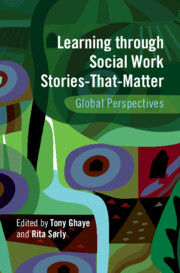Book contents
- Learning through Social Work Stories-that-Matter
- Learning through Social Work Stories-that-Matter
- Copyright page
- Contents
- Meet the Editors
- Meet the Contributors
- Preface
- Acknowledgements
- Introduction
- Part I Storying-to-Learn: How Stories-that-Matter Help Us Appreciate Social Work in Action
- Chapter 3 The Shortest Distance between Two People Is a Story
- Chapter 4 The Gift of Social Work
- Chapter 5 Dreams, Reality, and Invisibility
- Chapter 6 Who Do I Want to Be as a Social Worker?
- Chapter 7 Social Work in Need of Activism
- Chapter 8 On My Toes
- Chapter 9 A Story of Love, Family, and Mental Health
- Chapter 10 Pieces of Walnut
- Chapter 11 “Kurdistan Is My Country”
- Chapter 12 Living in a Pause
- Chapter 13 Promissory Notes and Other Forms of Consent
- Chapter 14 For Some People You Make a Difference, You Carry Their Hope
- Chapter 15 Partner in Decolonization
- Chapter 16 Human Rights Approaches of Pashtun Tahafuz Movement
- Chapter 17 Empathy from Origin
- Chapter 18 Welfare Transitions in an Agrarian Community
- Chapter 19 Former Refugee Youth in Rural Northern Norway
- Chapter 20 Social Work
- Chapter 21 Reflections on Psychiatric Social Work in an African Setting
- Part II Lenses and Lessons
- Index
- References
Chapter 17 - Empathy from Origin
A Colombian Social Worker’s Life Story
from Part I - Storying-to-Learn: How Stories-that-Matter Help Us Appreciate Social Work in Action
Published online by Cambridge University Press: 28 August 2025
- Learning through Social Work Stories-that-Matter
- Learning through Social Work Stories-that-Matter
- Copyright page
- Contents
- Meet the Editors
- Meet the Contributors
- Preface
- Acknowledgements
- Introduction
- Part I Storying-to-Learn: How Stories-that-Matter Help Us Appreciate Social Work in Action
- Chapter 3 The Shortest Distance between Two People Is a Story
- Chapter 4 The Gift of Social Work
- Chapter 5 Dreams, Reality, and Invisibility
- Chapter 6 Who Do I Want to Be as a Social Worker?
- Chapter 7 Social Work in Need of Activism
- Chapter 8 On My Toes
- Chapter 9 A Story of Love, Family, and Mental Health
- Chapter 10 Pieces of Walnut
- Chapter 11 “Kurdistan Is My Country”
- Chapter 12 Living in a Pause
- Chapter 13 Promissory Notes and Other Forms of Consent
- Chapter 14 For Some People You Make a Difference, You Carry Their Hope
- Chapter 15 Partner in Decolonization
- Chapter 16 Human Rights Approaches of Pashtun Tahafuz Movement
- Chapter 17 Empathy from Origin
- Chapter 18 Welfare Transitions in an Agrarian Community
- Chapter 19 Former Refugee Youth in Rural Northern Norway
- Chapter 20 Social Work
- Chapter 21 Reflections on Psychiatric Social Work in an African Setting
- Part II Lenses and Lessons
- Index
- References
Summary
1. What insights about different ways of becoming a social worker has Liam’s life story brought to the fore? 2. What stories have you met in your own social work practice that have affected your way of understanding what ought to be the core of social work? 3. How do you from your own experiences understand the expression ‘social work poetry’? How could it be an inspiration in your own work?
Information
- Type
- Chapter
- Information
- Learning through Social Work Stories-That-MatterGlobal Perspectives, pp. 234 - 251Publisher: Cambridge University PressPrint publication year: 2025
References
Accessibility standard: Inaccessible, or known limited accessibility
Why this information is here
This section outlines the accessibility features of this content - including support for screen readers, full keyboard navigation and high-contrast display options. This may not be relevant for you.Accessibility Information
Content Navigation
Allows you to navigate directly to chapters, sections, or non‐text items through a linked table of contents, reducing the need for extensive scrolling.
Provides an interactive index, letting you go straight to where a term or subject appears in the text without manual searching.
Reading Order & Textual Equivalents
You will encounter all content (including footnotes, captions, etc.) in a clear, sequential flow, making it easier to follow with assistive tools like screen readers.
You get concise descriptions (for images, charts, or media clips), ensuring you do not miss crucial information when visual or audio elements are not accessible.
You get more than just short alt text: you have comprehensive text equivalents, transcripts, captions, or audio descriptions for substantial non‐text content, which is especially helpful for complex visuals or multimedia.
Visual Accessibility
You will still understand key ideas or prompts without relying solely on colour, which is especially helpful if you have colour vision deficiencies.
You benefit from high‐contrast text, which improves legibility if you have low vision or if you are reading in less‐than‐ideal lighting conditions.
